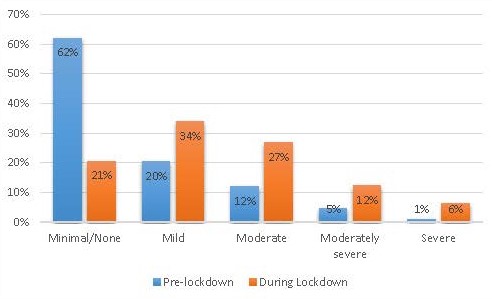Are the kids doing okay during lockdown?

The world wades through unchartered waters as it fights the COVID-19 pandemic. Apart from the direct physical health problems, the novel coronavirus has brought about a wide range of secondary effects that span from job losses to mental health deterioration. Regardless of exposure, people may experience fear and anxiety of falling sick or dying, helplessness, or blame of other people who are ill; all potentially triggering mental breakdown. The prolonged school closure and home confinement during a disease outbreak might have negative effects on children and adolescent’s physical and mental health too. A survey conducted in China during the initial outbreak of COVID-19 found that 53.8% of respondents rated the psychological impact of the outbreak as moderate or severe; 16.5% reported moderate to severe depressive symptoms; 28.8% reported moderate to severe anxiety symptoms, and 8.1% reported moderate to severe stress levels. The rampant sharing of conspiracy theories and fake news via different social media platforms is also compounding the effect of COVID-19 on people’s mental health.
In a bid to contribute to knowledge during this pandemic I conducted a snap survey between 21 April 2020 and 4 May 2020. The online survey targeted respondents aged between 10 and 29 who were in Zimbabwe, South Africa and Zambia. Findings show that young people are not coping well during this period with reported increases in depression levels. In total, 79% of the respondents reported some form of depression during the lockdown in comparison to 38% before the pandemic (see Figure 1 below). The preliminary findings show that the number of people reporting minimal or no depression during the COVID-19 lockdown decreased by 67% as compared to the period before the lockdown. Whilst the number of people reporting severe depression increased five-fold (from 1% to 6%) during the lockdown.

Figure 1: Depression severity as reported by the respondents
As the data shows most young people, about 79%, felt bored or lonely during the COVID-19 lockdown (see Table 1 below). Seventy-five percent indicated that they had the fear of their education not proceeding anytime soon, with 39% thinking about this nearly every day. 75% of the respondents reported fear of losing a parent or caregiver because of COVID-19. 60% of the respondents reported that they were afraid of falling ill and dying.
|
|
Not at all |
Several days |
More than half the days |
Nearly all the days |
| Fear of falling ill and dying | 40% | 29% | 12% | 19% |
| Feeling bored, or lonely? | 21% | 30% | 21% | 28% |
| Fear of losing a loved one (parent or caregiver) because of COVID-19 | 25% | 24% | 21% | 30% |
| Fear of schools/university/college not opening soon | 25% | 27% | 9% | 39% |
These heightened levels of depression and fear need to be addressed as soon as possible if we want to safeguard the mental health of young people. One way to do this is to find solutions that are tailor-made for young people and help them navigate through the pandemic. My contribution to these solutions has been the designing of a mobile-based counselling program that is being piloted in Zimbabwe with the possibility of scaling up to South Africa. The platform provides much-needed mental health counselling support to adolescents and young adults whilst identifying and referring those who are overwhelmed for secondary line treatment with psychiatrists or social workers.
The second opportunity is for scholars to carry out longitudinal studies on the mental health status of young people. There is scarce evidence on the long-term mental health effect of large-scale disease outbreaks on children and adolescents. Studies are needed to look at “how prolonged school closures, strict social distancing measures, and the pandemic itself affect the wellbeing of children and adolescents” Lee (2020, p.g. 1). The snap survey that I conducted needs to be expanded into a deep dive into the lives of young people in Zimbabwe and South Africa to capture the immediate and long-term effect of the COVID-19 pandemic. We need to also bring into such a longitudinal study other demographics such as persons with disability and young people who were not accessible during the online snap survey. The survey can be translated so that it is administered in vernacular to cover those who might not be comfortable with English.
I hope that a number of CCT scholars will volunteer to be part of collaborative action research across the SADC region. Stay safe and take care of your mental health as we adapt to the new, COVID-19 induced, world.
NB: Disclaimer
Hillary writes in his personal capacity and not as part of any research institution. Contact details: hmusarurwa2@gmail.com
